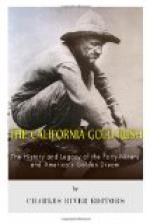Gatun was a collection of bamboo huts, inhabited mainly by fleas. One traveler tells of attempting to write in his journal, and finding the page covered with fleas before he had inscribed a dozen words. The gold seekers slept in hammocks, suspended at such a height that the native dogs found them most convenient back-scratchers. The fleas were not inactive. On all sides the natives drank, sang, and played monte. It generally rained at night, and the flimsy huts did little to keep out the wet. Such things went far to take away the first enthusiasm and to leave the travelers in rather a sad and weary-eyed state.
By the third day the river narrowed and became swifter. With luck the voyagers reached Gorgona on a high bluff. This was usually the end of the river journey. Most people bargained for Cruces six miles beyond, but on arrival decided that the Gorgona trail would be less crowded, and with unanimity went ashore there. Here the bargaining had to be started all over again, this time for mules. Here also the demand far exceeded the supply, with the usual result of arrogance, indifference, and high prices. The difficult ride led at first through a dark deep wood in clay soil that held water in every depression, seamed with steep eroded ravines and diversified by low passes over projecting spurs of a chain of mountains. There the monkeys and parrots furnished the tropical atmosphere, assisted somewhat by innumerable dead mules along the trail. Vultures sat in every tree waiting for more things to happen. The trail was of the consistency of very thick mud. In this mud the first mule had naturally left his tracks; the next mules trod carefully in the first mule’s footprints, and all subsequent mules did likewise. The consequence was a succession of narrow deep holes in the clay into which an animal sank half-way to the shoulder. No power was sufficient to make these mules step anywhere else. Each hole was full of muddy water. When the mule inserted his hoof, water spurted out violently as though from a squirt-gun. Walking was simply impossible.
All this was merely adventure for the young, strong, and healthy; but the terrible part of the Panama Trail was the number of victims claimed by cholera and fever. The climate and the unwonted labor brought to the point of exhaustion men unaccustomed to such exertions. They lay flat by the trail as though dead. Many actually did die either from the jungle fever or the yellow-jack. The universal testimony of the times is that this horseback journey seemed interminable; and many speak of being immensely cheered when their Indian stopped, washed his feet in a wayside mudhole, and put on his pantaloons. That indicated the proximity, at last, of the city of Panama.




